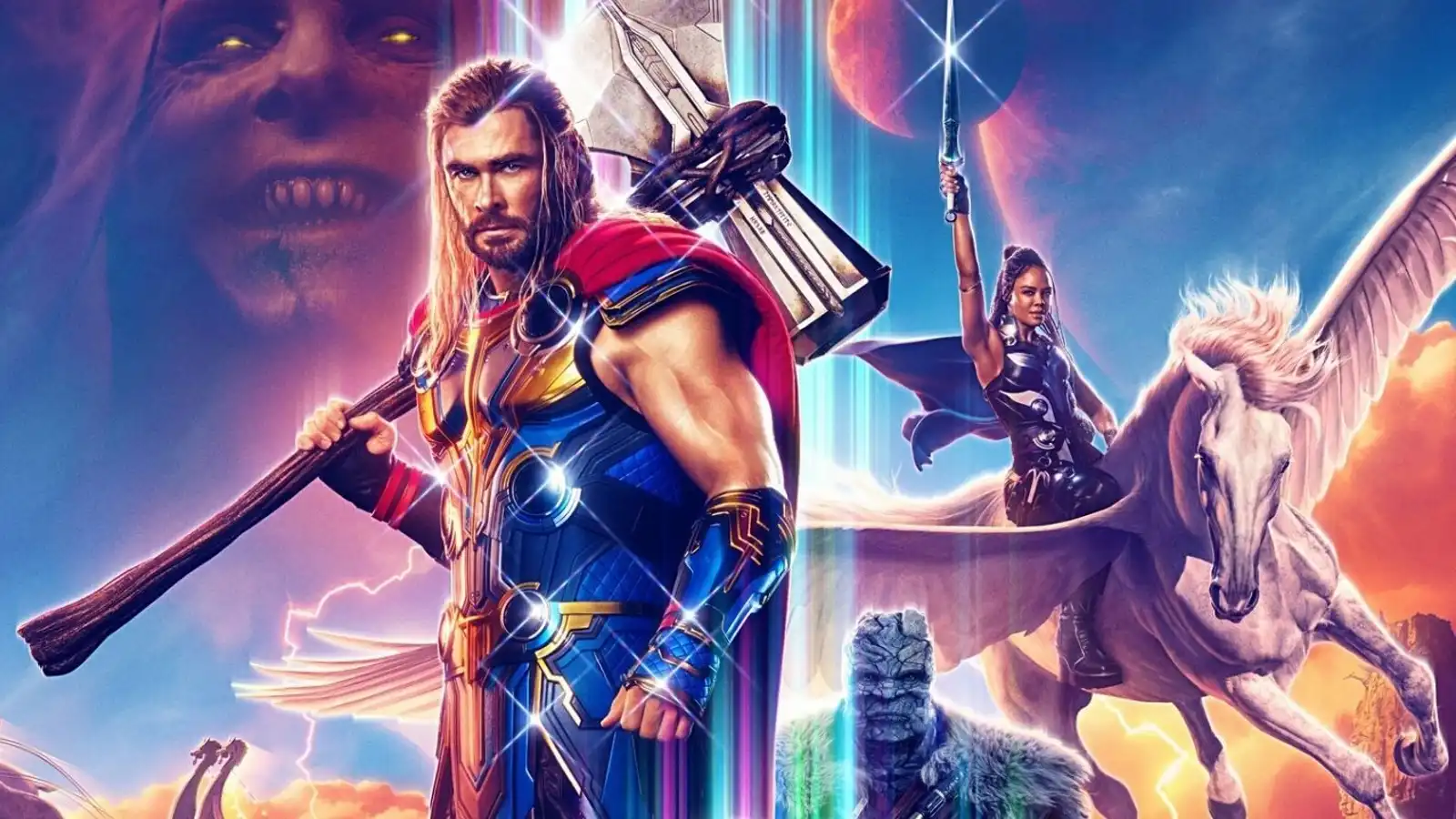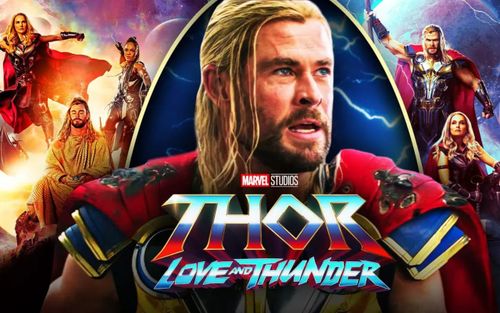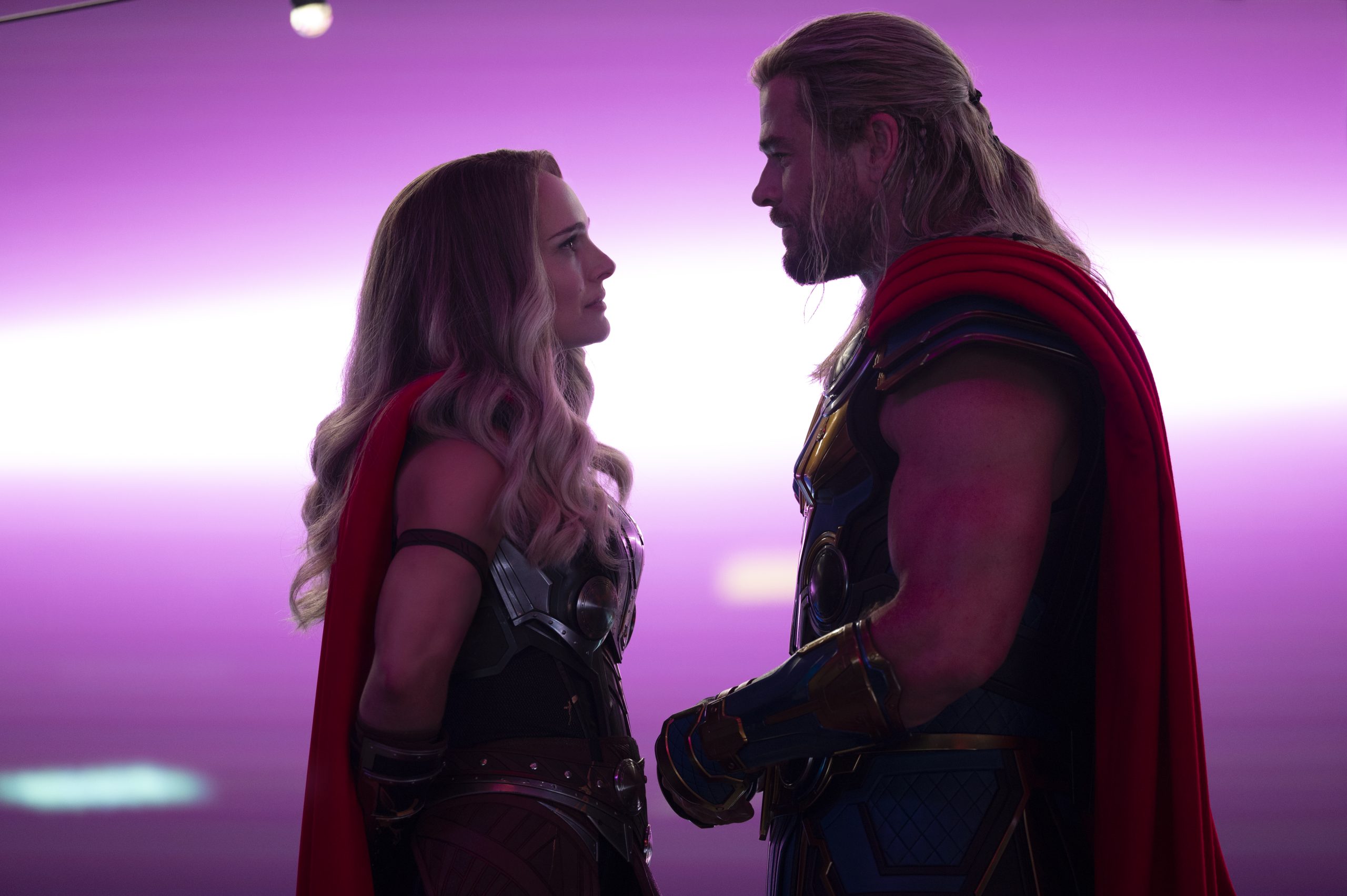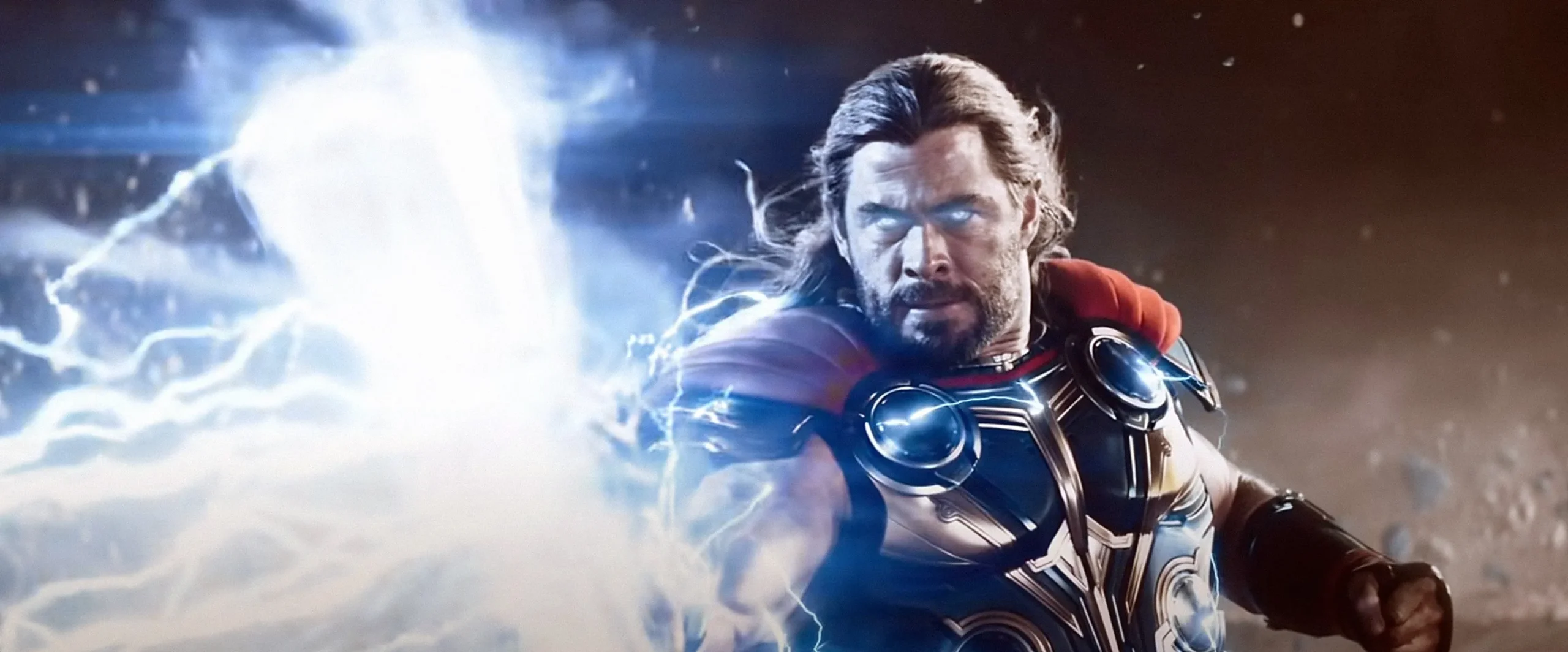Thor: Love and Thunder (2022)

Thor: Love and Thunder (2022) is the fourth installment in the Thor series within the Marvel Cinematic Universe (MCU), directed by Taika Waititi, who also directed Thor: Ragnarok (2017). This film continues the journey of Thor (Chris Hemsworth), but with a new set of challenges, deeper character exploration, and more cosmic adventures. The movie combines action, humor, and heart, staying true to Waititi’s signature quirky style while also delving into more emotional and dramatic themes.
Plot Summary:
The movie begins with Thor searching for inner peace after the events of Avengers: Endgame (2019). He has left behind the chaotic life of a hero, and we find him living a more relaxed existence, spending time with the Guardians of the Galaxy. However, his calm is disrupted when a new threat emerges in the form of Gorr the God Butcher (Christian Bale), a vengeful figure determined to eliminate all gods across the universe. Gorr’s mission is fueled by his own tragic past, where he lost his family and turned to a dark force known as the Necrosword.
Meanwhile, Jane Foster (Natalie Portman), who was once Thor’s lover, reappears. She has been diagnosed with terminal cancer and is mysteriously able to wield Mjolnir, the enchanted hammer that Thor once carried. This transformation allows Jane to take on the mantle of Mighty Thor and join the battle against Gorr, making her a key player in the cosmic showdown.
As the movie progresses, Thor, Jane, and their allies (including Valkyrie (Tessa Thompson) and Korg (Taika Waititi)) must face Gorr’s growing power, which threatens not just gods but all life in the universe. They embark on a quest to stop Gorr and uncover the truth behind his vengeance, leading to a final confrontation that tests Thor’s sense of worth, leadership, and the nature of heroism.
At the heart of the film is Thor’s personal journey, as he grapples with feelings of loss, the changing nature of relationships, and his role in the universe, especially now that others like Jane have taken on the mantle of heroism.

Key Themes:
- Identity and Self-Worth: One of the central themes of Thor: Love and Thunder is Thor’s struggle with his identity and his worth as a hero. After losing everything in Avengers: Endgame, Thor is trying to redefine himself, seeking peace and a simpler life, but constantly finding that his destiny pulls him back into action. His journey is about accepting who he is, flaws and all, and learning that heroism isn’t just about power or fame—it’s about fighting for what’s right, no matter the cost.
- Love and Loss: The film also explores love, both in terms of romantic relationships and personal connections. Thor’s relationship with Jane Foster is central to the plot, as it’s rekindled after years of separation, but with the added complication of Jane’s illness. The idea of love as both a source of strength and vulnerability is explored deeply, especially as Thor and Jane’s relationship is tested by their roles as superheroes. The film also delves into the loss that characters like Thor and Gorr experience, and how grief can shape one’s actions.
- Grief and Vengeance: Gorr the God Butcher’s backstory is one of immense loss and suffering. His transformation into a vengeful figure who seeks to annihilate all gods serves as a powerful counterpoint to Thor’s journey. The film explores how grief can fuel destructive impulses and how forgiveness and understanding can ultimately help heal wounds. Gorr’s actions force Thor to confront the consequences of his own existence as a god and the impact of the gods’ actions on the lives of ordinary beings.
- Heroism and Legacy: The mantle of heroism is passed on in Love and Thunder, as Jane Foster becomes Mighty Thor, taking on the role of a hero despite her illness. Thor’s evolution is also reflected in his understanding that being a hero isn’t just about physical strength; it’s about being there for others and making sacrifices for the greater good. The theme of legacy plays an important role, as characters like Thor and Jane deal with their pasts while also creating new legacies through their actions.

Key Characters:
- Thor (Chris Hemsworth): The Asgardian god of thunder, Thor is in the process of searching for inner peace after his experiences with the Avengers. He embarks on a journey of self-discovery and personal growth, ultimately learning what it means to be a hero and a leader. His humorous and laid-back personality contrasts with the depth of his emotional struggles, providing a blend of comedy and heart in the film.
- Jane Foster / Mighty Thor (Natalie Portman): Jane returns to the MCU after her absence in Thor: Ragnarok. She is diagnosed with cancer and unexpectedly becomes the new Thor when she wields Mjolnir, gaining Thor’s powers. Jane’s transformation into Mighty Thor is central to the plot, as she not only fights alongside Thor but also deals with the personal challenges of her illness and the weight of the Thor legacy.
- Gorr the God Butcher (Christian Bale): The main antagonist of the film, Gorr is a tragic figure driven by grief and a desire for vengeance against the gods. His backstory is dark and emotional, and his desire to annihilate the gods of the universe is rooted in his own tragic experiences. Bale’s portrayal of Gorr is intense and haunting, bringing a sense of depth to the character that goes beyond typical villainy.
- Valkyrie (Tessa Thompson): The new King of New Asgard, Valkyrie is a fierce and loyal ally to Thor, though she grapples with her own leadership responsibilities. She serves as both a comic and emotional foil to Thor’s character, providing wisdom and support during the battles against Gorr. Her storyline also touches on her own sense of identity as a leader.
- Korg (Taika Waititi): The rock-like warrior and Thor’s loyal friend, Korg provides much of the film’s comic relief. His lighthearted attitude contrasts with the seriousness of some of the film’s themes, but he also adds a sense of warmth and humor to the story.
- Russell Crowe as Zeus: Zeus, the king of the Greek gods, is introduced in Thor: Love and Thunder, bringing a flamboyant and comedic tone to the film. His character is a mix of comedy and arrogance, and his presence adds to the broader cosmic mythology of the MCU.

Action and Humor:
As in Thor: Ragnarok, Love and Thunder is packed with action sequences that blend spectacle with humor. The film features epic battles, including Thor and Mighty Thor teaming up to fight Gorr and his minions. The action is fast-paced, visually stunning, and often humorous, with moments of levity amidst the high-stakes conflict. The Guardians of the Galaxy also make an appearance in the beginning of the film, offering their signature chaotic energy to the action.
The humor, however, is more prominent throughout the film, with Taika Waititi’s trademark style taking center stage. From Thor’s ongoing relationship with his hammer, Mjolnir, to the banter between Valkyrie and Korg, the film never shies away from lightening the mood with witty one-liners, absurd situations, and quirky characters.
Visuals and Tone:
The film is visually stunning, with vibrant colors, dazzling cosmic landscapes, and creative action sequences. The sequences involving the gods and their realms are beautifully crafted, blending mythological elements with futuristic design. The introduction of Zeus and the depiction of his Greek god domain are some of the highlights, showcasing a more fantastical and surreal side of the MCU.
The tone of the film shifts between comedy and drama, balancing lightheartedness with deeper emotional moments. While the humor is strong and often absurd, especially in Waititi’s direction, the film also doesn’t shy away from exploring grief, love, and loss, adding emotional weight to the more comedic elements.

Reception:
Thor: Love and Thunder received a generally positive reception from audiences and critics. The humor, performances (especially from Chris Hemsworth and Natalie Portman), and visual effects were praised, but some critics felt that the film didn’t quite live up to Thor: Ragnarok, especially in its pacing and tonal shifts. Christian Bale’s performance as Gorr was widely lauded, though some felt that his character could have been developed further.
Fans of the MCU enjoyed the new dynamics introduced, particularly the relationship between Thor and Jane. The film’s more emotional and personal stakes were appreciated by many, especially as it gave Thor a deeper sense of vulnerability, allowing for character growth beyond his usual brash heroism.
Conclusion:
Thor: Love and Thunder is a fun and emotionally resonant film that combines the cosmic action of the MCU with a personal journey of self-discovery and healing for Thor. With vibrant visuals, comedic moments, and deeper themes of love, loss, and identity, the film offers a satisfying continuation of Thor’s character arc. While it may not be as universally adored as Thor: Ragnarok, it serves as a strong and heartfelt entry into the MCU, providing a fitting conclusion to some of Thor’s long-running emotional arcs while leaving the door open for future adventures.










